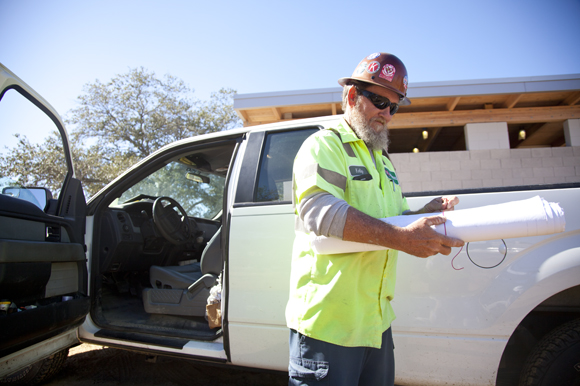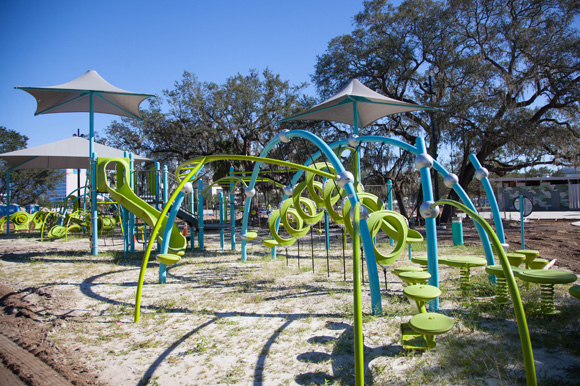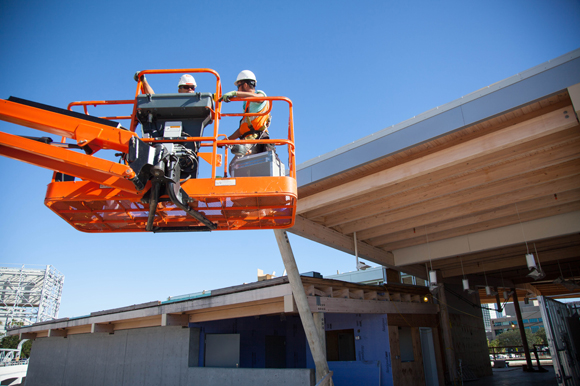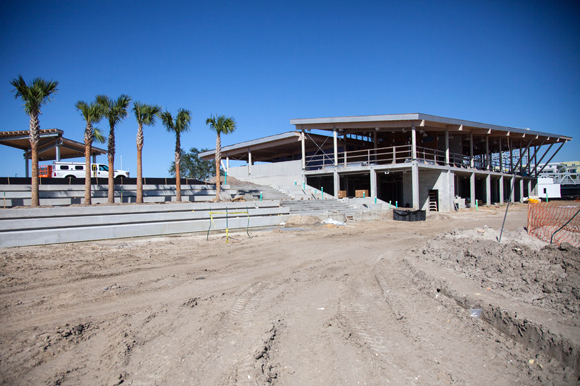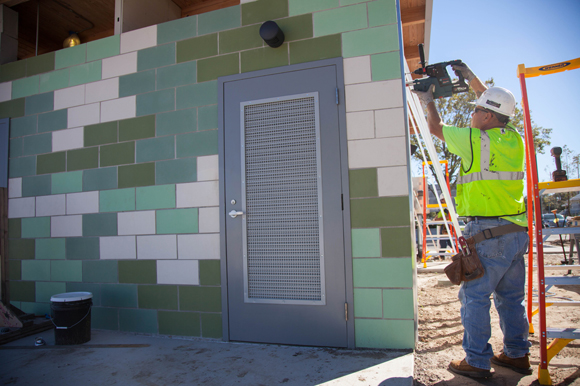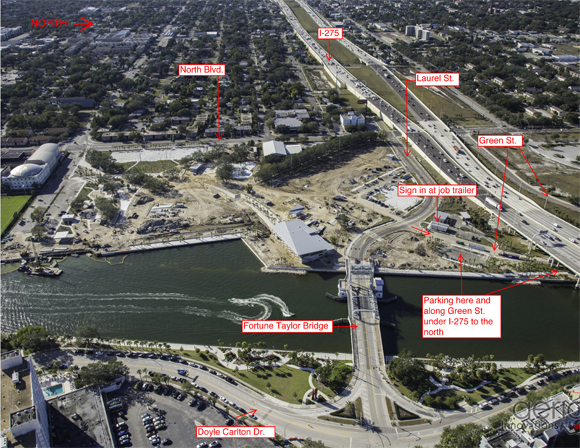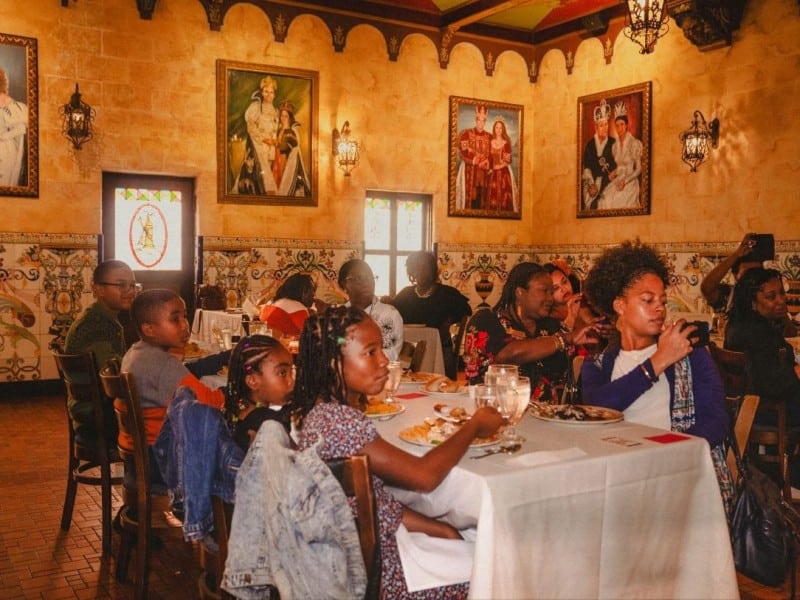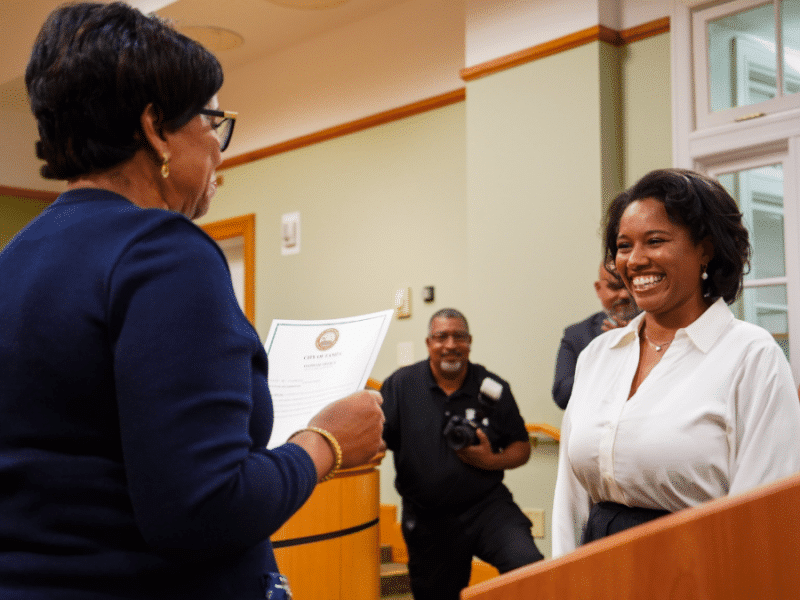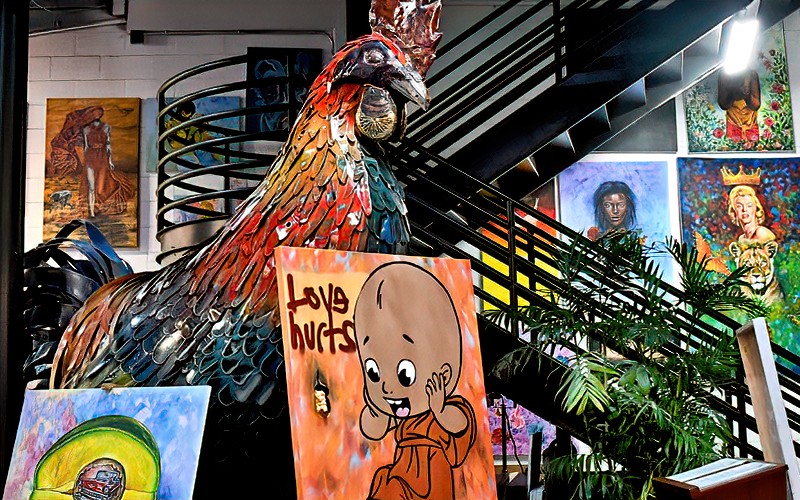Park redo creates key community gathering space for West Tampa
The newly renovated Julian B. Lane Riverfront Park in West Tampa will offer an abundance of outdoor activities and event space, similar to Curtis Hixon Park across the Hillsborough River in downtown Tampa.
In a few months, visitors to the reopened and revitalized Julian B. Lane Riverfront Park will have a panoramic look at the downtown skyline, Hillsborough River and the shiny minarets atop Plant Hall at the University of Tampa.
The $35.6 million makeover of the underutilized park will feature a slew of improvements to take advantage of the prime location on the west bank of the Hillsborough River. They will include the new boat house and community center with a shaded second floor deck facing the river and downtown.
“We think it’s one of the best views around,” says Karla Price, a landscape architect with the City of Tampa Parks and Recreation Department and the city’s project manager for the park redevelopment.
City officials also think they will also have one of the best parks around. Closed by construction for approximately two years, Riverfront Park is currently scheduled to reopen to the public in May.
The massive renovation and improvement project is another piece in Tampa officials’ ongoing campaign to establish the Hillsborough River as the center of Tampa’s urban core, not its western edge, and redevelop a blighted area near Interstate 275 and the river.
A neighborhood gathering place
Julian B. Lane Riverfront Park stretches along the river off North Boulevard. The Roberts City neighborhood once stood on the site, before it was razed in the 1960s to make way for Interstate 275 and a purported urban renewal effort. The park, originally known as simply Riverfront Park, was built in 1977.
Outside of pick-up games on the basketball courts, the Boys & Girls Club and some youth football games, the park never became a community gathering place.
Tampa hired Denver Civitas, a Denver-based landscape architecture and design firm, and construction management firm Skanska USA to reshape, the 25-acre park into an asset for the neighborhood and a riverfront destination to draw in visitors from Tampa and beyond.
“It was never very successful socially because it wasn’t designed to be social or recreational,” Civitas Owner Mark Johnson says. “It didn’t have anything to offer for people who live there and it didn’t address the river at all.”
When Civitas started in early 2014, the lingering negative feelings about past projects done in the name of urban renewal made it particularly important to listen to the community and build trust, Johnson says.
“We were very familiar with the history of West Tampa,” he says. “In neighborhoods that are heavily African-American, I’ve learned that it is really important to get to know people. We actually started the project with a series of one-on-one and small group interviews and meetings to get the lay of the land and see what the community was thinking. Because we knew that the West River redevelopment plan was nearing completion.
“There was talk of buying Presbyterian Village, which happened and the complex is gone now, and redeveloping North Boulevard Homes, which is happening now. There was a lot of change taking place in the neighborhood and I wanted to personally hear how people felt about that change. That led to understanding the sentiments and memories of folks in the neighborhood. We were able to come to the first official public meeting demonstrating that we understood that and we wanted to listen.”
At community meetings, residents wanted a community gathering place where families could picnic and children could play. The redevelopment includes a slew of additions to make that vision reality. There will be picnic pavilions with grills and game tables for dominoes, checkers and chess in an area shaded with trees. Children will have a splash pad, a brand-new shaded playground and tie downs for bounce houses. For recreation, there will be new basketball, tennis and pickle ball courts and a new multi-use athletic field. There will also be a dog park with separate areas for large and small dogs.
Sidewalk and trail improvements for pedestrians will better tie the park to adjacent neighborhoods and downtown.
Foot traffic from entrances on North Boulevard can follow a walkway lined with live oaks toward the heart of the park. A walkway under the Laurel Street Bridge will connect the north and south areas of the park and the wide sidewalks on the bridge will be a walkway to the east bank.
“It will be connected to the Riverwalk,” says Jake Krehbiel, a project manager with Skanska USA. “People will be able to walk to the park from downtown.”
Along the west bank, the park will be a link on a paved trail network that is planned to run from Westshore Boulevard to Columbus Avenue on the west bank of the Hillsborough, says Brad Suder, the Planning and Design superintendent for the City of Tampa Parks and Recreation Department.
A destination on the river
The redesigned, rebuilt park will include a slew of facilities to take advantage of its riverfront location.
“It will open a whole new kind of access to the water for both active and passive recreation,” Johnson says.
In addition to the outdoor deck, the second-floor of the concrete and timber boathouse will have a community room with a view of the river to rent for events. The bottom floor will have storage space for canoe, kayak, paddle board, crew and dragon boats. canoe, kayak, paddle board, dragon boats and crew boats. Kayak and canoe launch docks on a protected lagoon will give protection from motorized boat traffic along the river. Toward the north end of the park, there will be docks for motor boats an water taxis. The promenade bisecting the park and the great lawn for festivals and other events will both have sweeping views of the river.
The large earthen mounds that contributed to the less than welcoming look of the old park have been removed. The design of the new park will instead include public art such as murals and sculptures.
Tampa officials think the recreational river access and the chance to attend events along on the river will draw in visitors from across the city and beyond.
“I think it will be not only a local and city draw but potentially a regional draw,” Suder says.
To suggest additional story ideas, email 83 Degrees.
To subscribe to our free weekly e-magazine, follow this link.

